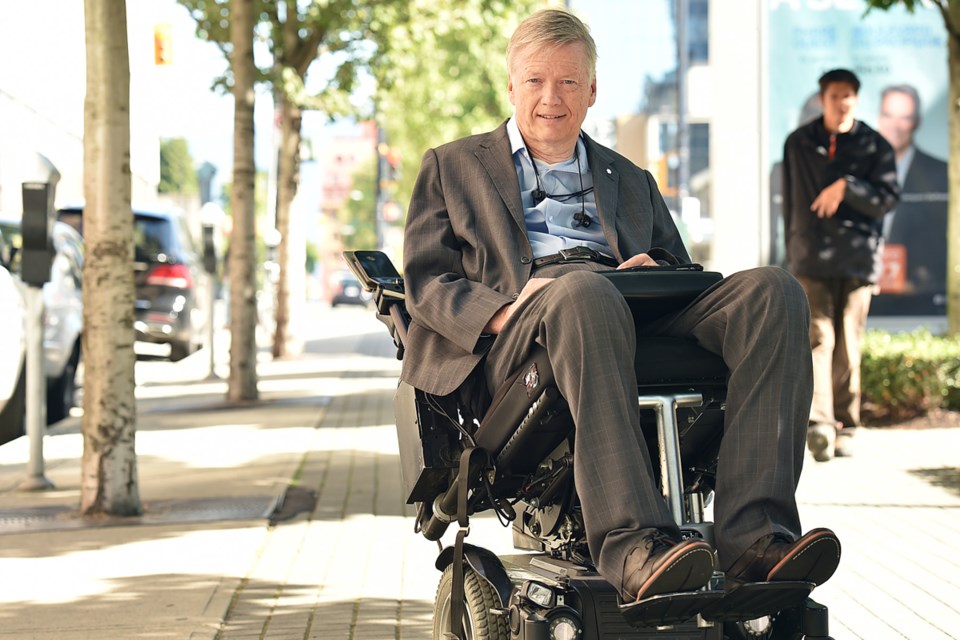Vancouver-False Creek MLA Sam Sullivan is promising to “end the overdose crisis” in British Columbia and increase the supply of rental housing if chosen to lead the B.C. Liberals at the party’s convention in February.
Sullivan made the promises in a video he released Thursday to launch his campaign to become leader of the B.C. Liberals, whose former leader Christy Clark resigned shortly after losing a confidence vote in the B.C. legislature.
“Today, house prices and overdose deaths are higher than ever,” Sullivan said in the video. “As leader, I will modernize city government so cities no longer prevent housing, but create housing and add hundreds of homes for rental — now empty because of strata rules. I’ll end the overdose crisis, so no one with an addiction will have to turn to dangerous street drugs.”
Sullivan said a treatment program that involves giving drug users prescription drugs would reduce gun violence, prostitution, homelessness and free up emergency rooms at hospitals.
His promises will sound familiar to those who remember the 57-year-old longtime politician’s term as mayor of Vancouver between 2005 and 2008. That’s when Sullivan rolled out his trademarked EcoDensity strategy to increase the supply of housing and his Chronic Addiction Substitution Treatment plan to have doctors prescribe drug users with prescription opioids.
The EcoDensity strategy led to an increase in laneway homes, but prices to own and rent homes have skyrocketed since Sullivan left city politics. His treatment plan never got off the ground. The plan called for doctors to prescribe legal drugs to up to 800 drug-addicted criminals and sex trade workers in the Downtown Eastside. The cost of the program, type of legal drugs and the number of doctors needed was never revealed.
As mayor, Sullivan spent a good portion of his time pushing Health Canada to approve his plan. He created Inner Change, a non-profit society to steer the plan, which is still active. Sullivan said in an interview Friday the society raised “several million dollars” and funded the Study to Assess Longer-term Opioid Medication Effectiveness, more commonly known as the SALOME trials.
“To this day, we still have over 100 people with addictions that are receiving prescription opioids,” Sullivan told the Courier. “That showed very powerful results. Not one of those seriously addicted people have died of fentanyl. They all have housing, their criminality has gone down dramatically. For me, it’s a no-brainer — let’s do more of that.”
More than 900 people died of a drug overdose in B.C. last year, and Vancouver is on pace this year to reach 400 deaths by the end of the year. The majority of the deaths were linked to fentanyl, the deadly synthetic opioid.
Sullivan’s treatment plan and increasing housing supply are highlighted in his video as central planks in his platform. He also wants to bring in a modified version of the harmonized sales tax, allow limited privatization of health care, enable charter schools, sell off government liquor stores, lift privacy restrictions on medical data for researchers and create a “binding royal commission” to sort out the overlaps of the work done by police, firefighters and paramedics.
Sullivan was narrowly re-elected in his riding in the May provincial election. During his time as an MLA under then-premier Clark, he was only appointed as a minister in the waning weeks of the B.C. Liberals.
Clark and Sullivan had a history going back to 2005 when Sullivan surprised many by beating Clark in the NPA’s mayoral nomination race. He went on to beat Vision Vancouver’s Jim Green in a nasty battle, some of which was captured in the documentary Citizen Sam.
Sullivan referred to Green, who died in 2012, as a “bully” and “desperate beast.” Near the end of the campaign, Sullivan appears on camera saying, “I’m going to keep my foot on his God damn throat and I’m going to just keep pressing.”
Asked whether the Sullivan in the documentary is still the same person today, he said: “I think I’ve become softer in my old age, at least I hope so. I’ve become more introspective and a little bit more wiser.”
As mayor, Sullivan also launched “Project Civil City” with the aim to reduce homelessness, the open drug market and aggressive panhandling by 50 per cent by 2010. The goals were never reached, although the program was never properly measured because Vision Vancouver scrapped it and ended the contract of civil city commissioner Geoff Plant. But Sullivan said "one of the long-lasting achievements" of the strategy was the creation of the Streetohome Foundation, which has raised and donated millions of dollars for new social housing.
Sullivan didn’t get a chance to run for mayor in 2008 because he was defeated by then-city councillor Peter Ladner in the NPA’s mayoral nomination race. Ladner lost to Vision’s Gregor Robertson, who has been re-elected three times.
Sullivan, who lives in Yaletown, was the first person to announce his bid for the leadership of the Liberal party. Former education minister Mike Bernier and Conservative MP Dianne Watts are expected to launch their campaigns this weekend.
Former cabinet ministers Andrew Wilkinson, Mike De Jong and Todd Stone are other possible contenders. Newly elected MLA Michael Lee, who won the Vancouver-Langara riding in May, is also said to be interested in a bid.



